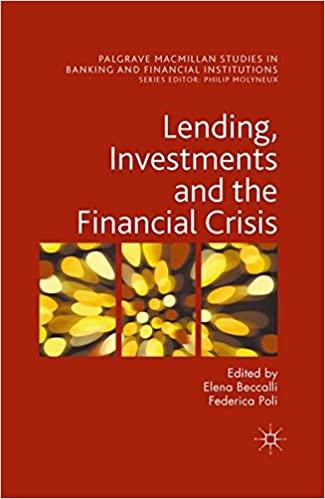Question
1 . A company is evaluating the feasibility of investing in machinery to manufacture an automotive component. It would need to make an investment of
1. A company is evaluating the feasibility of investing in machinery to manufacture an automotive component. It would need to make an investment of $520,000 today, after which, it would have to spend $8,000 every year starting one year from now, for eleven years. At the end of the period, the machine would have a salvage value of $12,000. The company confirmed that it can produce and sell 8,200 components every year for eleven years and the net return would be $12.50 per component. The company's required rate of return is 7.00%.
a. What is the Net Present Value (NPV) of this investment option?
2.
A company is developing a new product. The development of the product requires an initial investment of $140,000 with further investments of $80,000 in year 1, $50,000 in year 2 and $10,000 in year 3. The company will launch the product on the market in year 3 and the company expects annual profits of $60,000 from year 3 to year 7. At the end of year 7, the company expects to terminate the production line and sell it to a competitor for $90,000. The company's required rate of return is 6.5%.
a. Calculate the NPV for this product.
3.
A manager is deciding between two marketing campaigns:
- Campaign A will generate net returns of $145,000 one year from now and $35,000 three years from now.
- Campaign B will generate net returns of $30,000 one year from now and $145,000 four years from now.
The required rate of return is 8.00%.
a. What is the Discounted Cash Flow (DCF) of Campaign A?
b. What is the Discounted Cash Flow (DCF) of Campaign B?
4.
Due to a restricted budget, a company can only undertake one of the following projects: Project X: This project has an initial investment of $850,000 and annual profits of $400,000 in year 1, $425,000 in year 2 and $350,000 in year 3. Project Y: This project has an initial investment of $850,000 and a profit of $950,000 in year 3.
a. Calculate the IRR for Project X.
b. Calculate the IRR for Project Y.
5. Clara operates a specialized financial services business in Toronto. She's currently considering purchasing an exclusive service agreement from a competitor for $110,000, but would like to ensure that the investment would meet her payback rule of five years. The service agreement would guarantee net returns of $31,000 per year, but would also require her to pay $16,000 for a regulatory audit every other year (starting from the first year).
a. What is the payback period on this investment?
year(s)
month(s)
Round up to the next month
b. Does this investment satisfy Clara's payback rule?
Yes or No
Step by Step Solution
There are 3 Steps involved in it
Step: 1

Get Instant Access to Expert-Tailored Solutions
See step-by-step solutions with expert insights and AI powered tools for academic success
Step: 2

Step: 3

Ace Your Homework with AI
Get the answers you need in no time with our AI-driven, step-by-step assistance
Get Started


